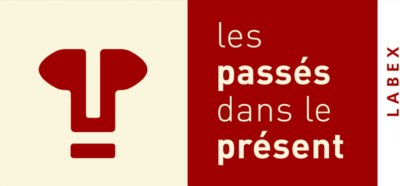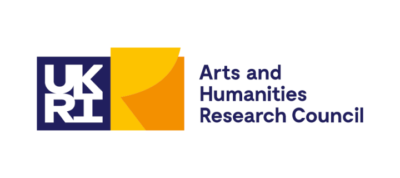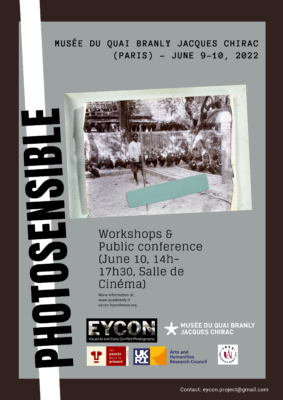Recent digitisation efforts of historical photographs by archival institutions have often been done in silo. This is an issue for researchers and archivists, but it also raises the question of public uses of history when it comes to contemporary perspectives on colonial/imperial warfare. Indeed, disconnected visual repositories reinforce deeply entrenched notions of national exceptionalism in France, Britain and in other states with a history of international interventionism and expansionism. Drawing on advanced technologies such as Artificial Intelligence, EyCon aims at connecting, analysing and commenting on these divided repositories to increase the discoverability and usability of overlooked and scattered material on colonial, imperial and international armed conflicts up to 1918. EyCon (Visual AI and Early Conflict Photography) brings together Humanities scholars, technical experts, archivists and other stakeholders to produce innovative research at the juncture of computer science, archival studies and history. It will also make digitised records more accessible to a wide range of users. EyCon’s primary objective is to assess the usefulness of computation to visualise, navigate and analyse large visual corpora.
EyCon aims at harnessing and questioning computation as well as testing new approaches to visualisation when it is applied to historical investigation. In doing so, it addresses the ethical and epistemological issues raised by the application of AI tools to controversial pasts.
EyCon has two specific objectives:
1 – The aggregation of data into a thematic collection on early conflict photography A wide array of photographic material from disconnected repositories will be aggregated into a thematic collection on early conflict photography (1890-1918) with a focus on non-European theatres of war. Image extraction scripts will be used to enrich the database with photo-engravings from digitised published material. The collection will be interoperable and consistent with the IIIF framework.
2 – The development of AI techniques for historical enquiry and data enrichment of a large visual corpus of historical photographs EyCon’s aims at providing researchers and other users with integrated computational tools to apply distant vision to its visual database and solutions to augment their close reading capacities.
The project team will use AI-reliant tools:
- To compare and search images for similaritiesTo optimise the visualisation of a large visual corpora thanks to image embeddings, topic modeling and clustering;
- To isolate photographic tropes, subgenres as well as significant “anomalies” in the visual collection;
- To retrain existing datasets on earlyconflict photographs.
Photosensible
Team:
- Prof. Daniel Foliard (French co-PI) is a historian whose core interest is on modern European imperialisms. His first book Dislocating the Orient. British Maps and the Making of the Middle East, 1854-1921,” was published by the University of Chicago Press. Combattre, punir, photographier. Empires coloniaux, 1890-1914, his second monograph, was published in French by La Découverte in 2020. It focuses on photography and colonial conflicts. It will be published in English by Manchester University Press in 2022. Foliard has developed a robust expertise in the historical exploration of sensitive material documenting colonial and imperial contexts.
- Dr Lise Jaillant (UK PI) was awarded a British Academy Rising Star Engagement Award (2017-18) for her project “After the Digital Revolution,” which was followed by an AHRC Leadership Fellowship (2018-20) to work on the born-digital records of the poetry publisher Carcanet Press. Jaillant has extensive experience of international research networks. She is currently leading two AHRC-funded projects: AURA (Archives in the UK/ Republic of Ireland and AI: Bringing together Digital Humanists, Computer Scientists & stakeholders to unlock cultural assets) and AEOLIAN (UK/ US: AI for Cultural Organisations). Recent publications include the edited collection “Archives, Access and AI” (to be published open access in October 2021), and articles such as “More Data, Less Process: A User-Centered Approach to Email and Born-Digital Archives” (accepted for publication in the world-leading journal American Archivist).
- Dr Julien Schuh (French PI and coordinator) has led several funded digital humanities projects (ModOAP and BaOIA, development of machine learning tools for the humanities) and the digital components of projects funded by the French National Research Agency (in particular the Numapresse project, aiming to write a history of the French press since 1800 from digitised collections, with the creation of databases and digital tools for automatic analysis). He is also a specialist in the history of the illustrated press at the turn of the 19th and 20th centuries.
- Marina Giardinetti (Research Assistant)
Partners:
Academic partners
- Loughborough University
- Labex Passés dans le Présent
- Université de Paris
- LARCA UMR 8225
- LIPADE
GLAM sector partners
- Archives nationales d’outre-mer (France)
- Bibliothèque Nationale de France- Datalab (France)
- ECPAD (France)
- Imperial War Museum (Royaume-Uni)
- La Contemporaine (France)
- Musée du Quai Branly Jacques Chirac (France)
- National Library of Scotland (Royaume-Uni)
- Service Historique de la Défense (France)
- Wellcome Collection (Royaume-Uni)





